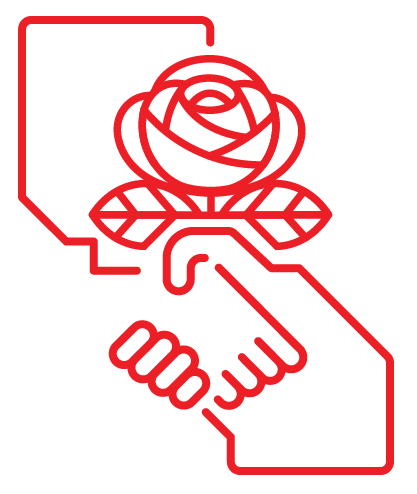East Bay Transit campaigns link workplace demands to broader political struggles
East Bay DSA’s People’s Transit Alliance (PTA) is organizing at the intersection of labor solidarity and electoral politics. PTA was born out of DSA member Jovanka Beckles’ successful 2020 campaign for the AC Transit Board of Directors. ATU Local 192, representing 1,800 AC Transit bus drivers, mechanics and service workers, recruited Beckles to run for the seat, and our chapter ran her campaign.
On the heels of that electoral success, our chapter kept the momentum going. Transit is a public good of crucial importance to the multiracial working class, affecting economic well-being, social justice and climate. The People’s Transit Alliance was created as a vehicle through which transit workers and riders could fight in solidarity for a better transit system while leveraging the potential of having a democratic socialist on the agency board.
Jovanka Beckles marches on Metropolitan Transportation Commission HQ with ATU 192 leader Nate Arnold
COVID Solidarity
The COVID-19 pandemic decimated transit service, and agency inaction exposed both transit workers and riders to extreme hazards on the bus. In late 2020, PTA supported the San Jose local, ATU 265, in winning fare-free, rear-door boarding. Within weeks, Beckles had put the matter on AC Transit’s board agenda. In February 2021, PTA and Local 192 leadership co-hosted a virtual townhall to discuss rear-door-boarding policies. PTA members heard directly from rank-and-file workers about the issue.
In May 2021, PTA organized a pressure campaign, calling on the Bay Area’s Metropolitan Transportation Commission (MTC) to release $1.7 billion in federal COVID-relief funding for transit. About 100 transit workers and riders from across the region turned out for a San Francisco press conference and march on May 4 calling on MTC to release funds. Director Beckles spoke at the event, as did San Francisco transit rider Regina Islas, who accused MTC of “hoarding the $1.7 billion for a rainy day.”
“Well, MTC,” she said, “I brought your weather report: Today is that rainy day!”
At the action, DSA members had the chance to meet in person many of the ATU members we had heard from at the townhall. We learned more about the anger they felt at being treated by management as dispensable, and many workers explicitly raised the issue of hazard pay. While grocery and healthcare workers who rode their buses were getting hazard pay, not a single transit worker in all of California had received a penny.
PTA organizers, recognizing that the demand for hazard pay was broadly-felt among ATU members, saw a chance to deepen worker-rider solidarity. We worked with bus operator Sultana Adams and other transit workers, at Local 192 and Local 265, to support rank-and-file-led campaigns to win hazard pay by canvassing bus riders and organizing large rallies in San Jose and Oakland.
Rallying for hazard pay at Oakland city hall on the 75th anniversary of the Oakland General Strike
By early 2022, both locals had won new no-concession contracts, including “appreciation pay” for working on the frontlines throughout the pandemic.
But appreciation pay did not address all the issues that transit workers faced, leading many to quit or retire early, resulting in short-staffing and overwork for those who remained. The retention crisis also impacted transit riders: routes that had been cut in 2020 could not be restored and even scheduled service was unreliable due to a lack of back-up drivers.
Ending short staffing
Director Beckles, unsatisfied with management’s response to the crisis, wanted to hear directly from workers about the root causes of and solutions to the retention and hiring challenges at AC Transit – challenges that face transit agencies across the U.S. In April 2023, she invited ATU members to a video townhall to share their experiences and perspectives. Nearly 80 ATU members participated, and dozens spoke up.
Organizing for Transit
East Bay DSA canvasses bus riders with members of its Eden Branch in Hayward
PTA incorporated the key concerns – management’s lack of respect for workers, poor hiring and supervision practices, excessive discipline and micro-management, and excessive work hours – and solutions raised by the workers into a petition to AC Transit. The petition appeals to riders, because it frames the workers’ solutions as common-good demands with a direct impact on transit service provision. We continue to canvass riders, and our recent Hayward canvass brought 50 new riders into the campaign.
By connecting Beckles’ election to rank-and-file organizing and worker-rider solidarity, PTA is testing a new model for how DSA campaigns can connect labor and electoral organizing to build solidarity and power. At stake is winning the worker and rider control that is needed to make transit work for the multiracial working class.



